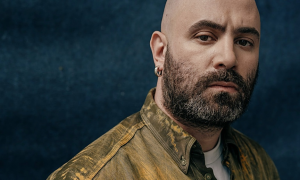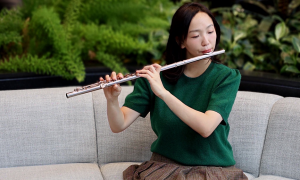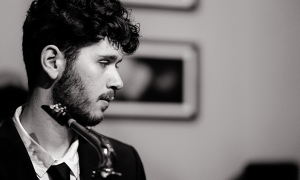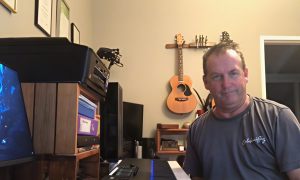Home » Jazz Articles » Take Five With... » Take Five with Bryan Lubeck
Take Five with Bryan Lubeck
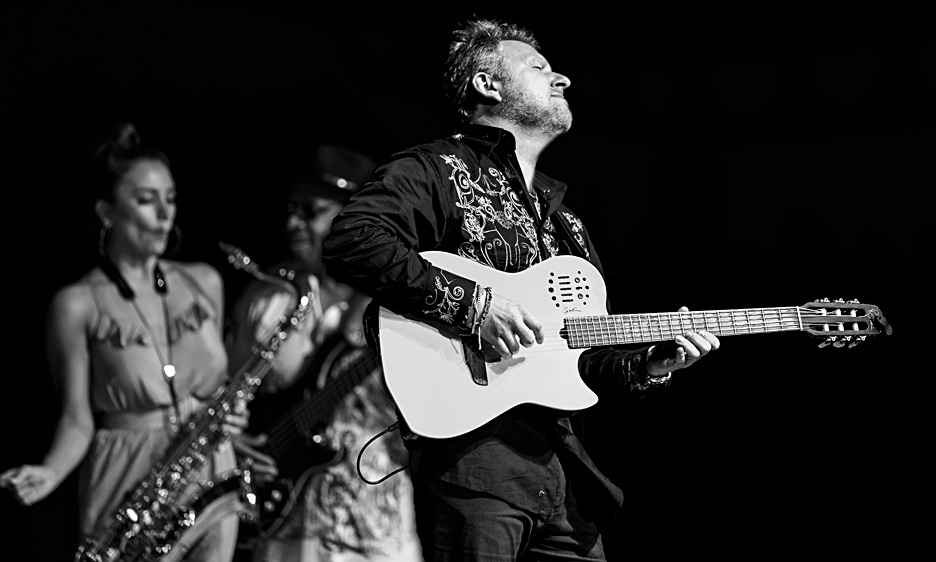
Meet Bryan Lubeck
Billboard Magazine's "Critic's Choice" Bryan Lubeck is known for the fusion of his romantic Spanish guitar style and smooth, energetic urban grooves. Bryan has become a familiar name in contemporary instrumental radio and streaming platforms over the last decade, with his 2021 release Midnight Sun becoming an Amazon #1 best-selling album. He began studying guitar at age 10 with a small-town teacher who also taught piano, bass, and mandolin. His teacher then picked some of her students to create a group of children performers that toured throughout the Midwest. He started to develop a sound mixing pop, jazz, Latin, and classical guitar. This early performing experience paid off many years later with a chance to open for Tower of Power superstar saxman Richard Elliot. After a standing ovation, Bryan believed he had hit on something and began work on an instrumental album Acoustic Vineyard. His goal was for people to be able to listen to his CD front to back while chilling on the deck with a glass of wine. Now with tens of thousands of albums sold, radio play, and millions of streams, he continues to produce music for instrumental fans and audiophiles around the world. Microsoft even used his song "Vineyard Groove" as one of their product launch theme songs.Instruments:
Guitar and flute. I am a fingerstyle recommending artist for both Cordoba and Godin nylon string guitars. In the studio, I exclusively use the Cordoba FWCE Gypsy Kings model, which is a thin line version and helps me get rid of the boom and bite through the mix as a lead guitar. Sound chain is simple—Vintage Blue Mic through an LA2A compressor and Focusrite preamp. For live performances, the Godin Multiac nylon string guitar gives me a studio sound through the large sound systems.Teachers and/or influences?
I had a very transient early life due to my mother being very ill. I think I was in four different schools in first grade alone. However, I had one constant—a guitar my mother bought me that I didn't know how to play but always kept under my bed wherever we were staying. In second grade, I finally settled down to live full time with my grandparents, and they found a guitar teacher for me. I was incredibly fortunate that in that small town in Indiana they found a woman who taught guitar, mandolin, bass, drums, and piano. She put her students together into a group and we started touring when I was 13—festivals, concerts, churches, backyard picnics... the works. We had denim outfits and everything. The pictures of us in the matching outfits exist in the dark corners of the internet. Ha!When I look back, I know how fortunate I was. Even more so when I think about how I started experimenting with fingerstyle guitar one lesson and she reached back to her bookshelf and pulled out a Segovia Spanish/classical guitar method book saying "now we will do this." That really created the beginnings of my unique style of fingerpicking and Latin guitar. I wish she could see what all happened, where her talents and teachings took me, and the places all over the globe her influence has taken me. I'd like to think somehow that she and my grandparents know.
I knew I wanted to be a musician when...
I've had a chance to talk about this question with many greats in the industry—Lindsey Buckingham (one of my inspirations/idols), Sheryl Crow, and others. They all seem to have that "moment." But, with me, I can't remember not wanting to play. I'm not sure there was a time when I wasn't playing or thinking about playing.JK Rowlings probably said it best when asked about how hard it was to find time to write in her early days before she hit it big. She said she "couldn't not write." I think that's me. There were times in my early teens when I would start to think about what success might look like. I was evenly split between wanting to take my chances on Broadway as much as being an independent musician. Even in college, my time was evenly spent studying classical guitar and singing and dancing/acting. I let them both play out and here we are.
Your sound and approach to music.
In my early days, I couldn't afford guitars. I had the basics. A cheap steel string acoustic and a high end Yairi classical guitar my guitar teacher gave me that was her late husband's. Naturally I gravitated towards the better instrument even though I played a lot of pop on it as much as my study of Segovia. I was always mixing pop (my favorite), jazz, and classical. It's what I heard in my head. Then I saw Chet Atkins and Earl Klugh (who was playing a classical guitar but was full on pop/jazz) and that gave me "permission" to explore my own sound with the classical guitar. I think in my head I'm a pop song "hook" writer -pretty simple chords but writing things that leave people humming. Combine that with my Latin guitar studies and a lot of time in Jazz Band and you end up with my mix of it all. I'm just thankful that hodgepodge resonates with so many people.Your teaching approach
I can only go by what worked for me. My teacher taught me single note playing—scales, etc. But she also taught me chords and songs simultaneously. This kept me interested and motivated. It gave me the foundation to try and combine the two before I even knew what fingerstyle was, and here we are.Your dream band
I had avoided having a band most of my life. I wanted to write and play solo. It was easier. It felt a lot more freeing. To have a band meant dealing with drama, schedules, and all manner of things that could dampen creativity.I did realize from my days being in musicals that collaboration and what others can bring to the mix is important. It creates magic. However, I just wasn't ready to make the leap for my own music.
So, for my early solo career I simply hired studio musicians and that was it. I finally decided at one point that I would do a "bucket list" item and put together a band for live shows of my music. At that point, I found the best players I could that were available and who were used to playing together. That is key. If they already know and have played with each other, you'll sound like you've been playing forever together.
A promoter saw us and off we went! I mixed up the players when people weren't available for shows but now, I pretty much have the live band lineup set and they all have incredible pedigrees. They have all played with artists you'd know instantly by name. I do, however, think about other musicians I'd love to collaborate on songwriting and duets with. I've been lucky to do this with a number of Grammy winners but, boy, if I could, I would love to do something with Sting, Lindsey Buckingham, Daryl Hall, Kenny Loggins, Ed Robertson (BNL), and a host of others
Road story: Your best or worst experience
Best experience...that's easy. Opening for one of the stars of my genre, Richard Elliot. He has rabid fans. I literally had just started doing my unique mix of pop/jazz/spanish guitar so I was a bit nervous. We went out on stage in front of thousands. After I signaled the drummer for the last hit of the show by looking at him and jumping in the air, I turned around to find a standing ovation. I was dumbstruck. I then went back to the merchandise tent and signed CDs for the next two hours straight.Worst experience...I've not had many. I usually take the ebbs and flows and the unexpected in stride. What really bugs me is when the lead act eats up all your soundcheck time and doesn't care that you will have none. That has happened twice and it's been the same guy. I guess in a way it's good as it really forced me to be a more gracious headliner. But, still it's basic humanity to care about your fellow musicians. This guy doesn't. He is a superstar, as well, so no names, but that behavior makes me crazy.
Favorite venue
Hands down the outdoor amphitheater Shadowland on the beach of Lake Michigan feels like home. It seats thousands and it's where I got my start. I always am welcomed when I come back. As for acoustics and indoors, there are so many great venues that it is hard to call out a few.Your favorite recording in your discography and why?
I'm primarily known as an instrumentalist. However, I started out also as a vocalist, so I do sing in my live shows even though the instrumental songs are what get all the radio play. In the days before the full-on streaming universe, the radio promoters wanted all instrumental songs (and therefore albums) so I refrained from singing on albums intentionally.When I was sitting down with my producer, Bill Dickens, who is one of the bass players for Stevie Wonder, to map out a new album, I wanted to see if he liked a song I had written for the album. I said that I was going to sing it just to give him an idea of the melody but that we'd do it as an instrumental. I was trying to remember chords and words so I didn't look up until I was finished. I was astonished to see him crying. He said it was one of the most beautiful songs he had heard and that if I didn't sing that song on the album he was off the project.
That was pretty dramatic but I'm glad he forced me to. It's called "Fall Of Rome." Not only do audiences love it but I hear often from the musicians I work with on live shows that it instantly becomes one of their favorites. Coincidentally, the drummer that played it in the studio with me years ago just texted me yesterday after several years to say it had come up in a playlist he was listening to. He said he had to text and just say how much he still loved it. He is out touring with Barry Manilow at the moment. That was humbling.
What do you think is the most important thing you are contributing musically?
Perhaps it's being that a guy who isn't particularly fantastic in any one genre but who can absorb multiple ones and then be true to the music while being successful. When I think of what really matters in music, it is what we give to the listener. The standing ovations and audience reaction don't compare to when I receive a personal note from a fan that says the music helped them through a particularly difficult time or is the soundtrack to important moments in their life and the lives of their family. Once I received a note from someone whose husband was dying of cancer saying that he wanted my concert to be his last. Something like that is hard to hear. But, it gives me rocket fuel to do more for people knowing that it can be something important or of value in their lives.Did you know...
I'm very curious and have no fear of trying new things so there are probably a number of things people don't know inside and outside of music. One thing is that beyond music, I have a love for marketing and have been a marketing executive at Microsoft. My music helps me think freely in marketing efforts and marketing has helped me be better at the business and promotion side of music. Neither of my passions are more important than the other. They are just who I am. Together they work and have made me successful beyond my wildest dreams in both aspects of my life. They uniquely came together during the pandemic when I helped create a virtual series for a large software company that brought technical information to IT professions combined with me interviewing music legends and having them perform. The virtual series was intended to help keep up morale for the company's customers and employees. It's a rare time that both of my passions came together in public.
To date, I've interviewed 20 legends including Lindsey Buckingham, Kenny Loggins, Michael McDonald, Seal, Vince Gil, Sheryl Crow, Daryl Hall, Boy George, Daughtry, Rick Springfield, Ed Robertson, and many more. Each performed, and in some cases I performed with them. The fact that I was an artist made the interviews and song playing sessions seem to the audience that we were just chatting and playing music in their living room. Bringing useful information and joyful entertainment to people during that tough time was an honor.
The first jazz album I bought was:
Wes Montgomery. To this day we are not sure how my grandparents who raised me in the middle of Indiana came to own that record, but it was magic to me. He was magic. Even though my music has a Latin angle to it, I guarantee in many moments you will hear Wes coming from my subconscious.Music you are listening to now:
Many are surprised to hear that I don't listen to a lot of music. For the longest time, my car radio code was reset and nobody knew it so I drove in silence for years. My music choices when I do listen are pretty eclectic. I listen to everything from '80's pop, punk, and hard rock to new age and jazz. I don't listen much to classical. Lately though, I have been buying old vinyl and, in the process, rediscovered Tony Mottola who I think is one of the greatest guitarists of all time. His recordings from the '60s are pure gold. I've listened to his album Latin Love-In (I bought it only because of the cover initially) at least 50 times. How he got that sound from the nylon string guitar and his orchestra in those early days of recording is mind-boggling. That's when you had to play it live and perfectly.Desert Island picks:
I'm game here. Sting (pick an album). Bob James, Lee Ritenour, Nathan East & Harvey Mason (Fourplay). Tuck Andress (Tuck and Patti). Lyle Lovette (Big Band). The Tubes (The Completion Backwards Principle). Windham Hill Sampler 1985Too many others to mention. Honestly, my top five favorite albums change daily and include literally all genres.
How would you describe the state of jazz today?
I think its fan's market. With digital streaming, the fan is in control. The benefit to that is artists old and new can be accessed by anyone. The downside for the artist is it's hard to financially survive.Even in the days of album sales it was hard to fill an arena with a jazz group and frankly who would want to. You want to be up close and personal. However, critical mass is needed for an artist to support themselves. My hope is that the genre gets new life as a result of the pandemic causing people to slow down their lives and appreciate the music. As things come back, hopefully they will explore it in a live setting. Of course, the state of any genre is a mixed bag no matter what time period you are in. I do have hope that this relatively new distribution method of streaming will continue to evolve and better reward the artist.
What are some of the essential requirements to keep jazz alive and growing?
If we are talking straight ahead jazz, I don't know that I have a good crystal ball for that. I think the trends that I hear from young people coming out with music now have incredible elements of jazz. This tells me that, somehow, they are listening and listening a lot for it to come out in their music.I think the key is supporting new artists even if they don't do it exactly the way we think they should. Awareness is key. Getting folks to listen and understand is key. New listeners, if they aren't already jazz lovers, will need to come to the music in different ways and that path may be through people that aren't traditional, straight-ahead players but who do a mix of styles that helps the listener become accustomed to the genre. Once that happens, they will buy in even more to the purer form of the style.
What is in the near future?
As we come out of the pandemic, there is still a lot of uncertainty. Everyone is fighting for streaming and radio space to make up the financial void that the lack of live shows has left. Right now, I'm fortunate that Midnight Sun has clawed its way up the charts and that the radio play has been good. It's time for me to think about how to leverage that into "what's next." That is a work in progress.What is your greatest fear when you perform?
Someone figures out I'm just making it all up and I don't know what I'm doing. Since I started as a classical guitarist, I don't have the pure jazz chops so many others do. I'm always thinking someone is out there in the audience thinking "Why is that joker up there and I'm not?"What song would you like played at your funeral?
When I had Covid, I thought about that. Oddly, I'm not sure I want music at my funeral. I'm sure with as many musical friends as I have, they will want to do music and I'd rather have it be something that they pick if there is music. After I'm gone, my hope is that my music continues to be of value to people in whatever way they need. Even if it's background music for cleaning the house. We all want to be valued.What is your favorite song to whistle or sing in the shower?
Glen Campbell's "Wichita Lineman"By Day:
As I said before, I'm blessed to have passions that don't really feel like work. One is music and the other is marketing -more specifically for big IT companies. I'm often asked why I'm not a full time musician because I have seen success that so many full time folks haven't.Honestly, I think it's because I have a balance of outside interests. Some years my income is 50/50 between the two. Most of the full-time musicians I know technically have second jobs within music. Even the big touring musicians -when they aren't on tour -still do weddings, lessons, and the like—similar to Broadway actors I know who are doing commercials and TV when they aren't in a show. One thing that is common is many of the full-time musicians don't have time to do their own projects as they are so busy playing with and working for others. I view my other forms of income as my solution to being able to fully focus on my own music and not having to find investors to support albums that I need to pay back or have to take direction from.
If I weren't a jazz musician, I would be a:
Broadway performer.If I could have dinner with anyone from history, who would it be and why?
I'd love to have dinner with (and be able to communicate through some translator) with someone for the ancient past. Maybe a Pharoah, one of the disciples, or even further back. My sense is our ancient ancestors weren't nomadic sheepherders and I want to verify that. How did they think and how did that do things that we, to this day, can't do or figure out?What are the elements of a great song?
I asked Kenny Loggins and Daryl Hall this, as they have both written some incredible music that is locked into the psyche of the world. They didn't talk about theory or song structure or anything like that. They both said something similar, which is people can sense when you are writing from your soul or your heart and aren't "trying" to write a hit. The listener can sniff that out quickly. In fact, many artists have stories of their greatest hits almost not being recorded or making the album because they loved it but didn't think others would. Good songs are where inspiration, being genuine to yourself, talent (even if it's unconventional), and having no fear of other's opinions meet.Tags
Take Five With...
Bryan Lubeck
AAJ Staff
Tower of Power
Chet Atkins
Earl Klugh
Sting
Wes Montgomery
Bob James
Lee Ritenour
Nathan East
Harvey Mason
Tuck Andress
PREVIOUS / NEXT
Support All About Jazz
 All About Jazz has been a pillar of jazz since 1995, championing it as an art form and, more importantly, supporting the musicians who make it. Our enduring commitment has made "AAJ" one of the most culturally important websites of its kind, read by hundreds of thousands of fans, musicians and industry figures every month.
All About Jazz has been a pillar of jazz since 1995, championing it as an art form and, more importantly, supporting the musicians who make it. Our enduring commitment has made "AAJ" one of the most culturally important websites of its kind, read by hundreds of thousands of fans, musicians and industry figures every month.










